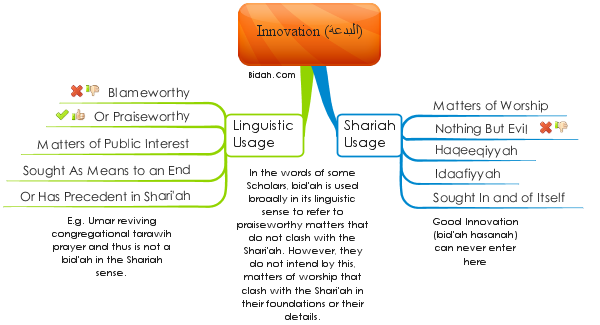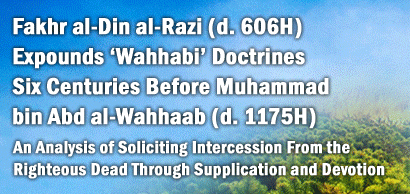| Wednesday, 17 December 2025 |
|
|
|
You are here:
 Introduction
It is known that the innovators, and in particular the Sufi grave-worshippers of our times, rely upon the statements of some Scholars who applied the five rulings (wajib, mustahabb, mubah, makrooh, haram) to the topic of bid'ah, or who may have spoken of innovation (bid'ah) as being both good and bad. What they do not reveal though is that these scholars are simply using the word "bid'ah" in its broader linguistic sense, and not strictly in its Shari'ah sense. If we consider this, then we can say that the differences between them and between those who say that all innovation is evil (meaning by that the Shari'ah definition only), is largely a difference of wording only, and that the former scholars are simply including other matters into the broader linguistic definition of bidah.At the same time, we can see clearly in their other speech (and their fatwas and rulings) that they warn against innovation (in worship) and opposing the guidance of the Messenger and performing worship in a manner other than that known in the Sunnah or adding to it or changing it.
Ibn Hajar al-Asqalani Explains the Usage of the Word Bidah in the Language of the Scholars Ibn Hajar said in Fath al-Bari (Maktabah Salafiyyah print, 13/278) in the book Holding Fast to the Book and Sunnah, in the chapter "What is disliked of delving and disputing in knowledge, exaggeration in the religion and innovations," the following:
And Ibn Hajar also said (13/253):
The point is made very clearly in that where the word "bid'ah" is used for praiseworthy matters, it is being used with its (broader) linguistic meaning, and Ibn Hajar makes a clear differentiation between its use in the legislative sense (as meant by the Shari'ah) and its use upon a purely linguistic meaning. The following diagram will help us to understand what is going on here and where we are leading towards:
 These two statements from Ibn Hajar al-Asqalani (rahimahullaah) allow us to develop a context by which we can understand the true and real intent of those who have spoken of "good bid'ah". It is this context that the dishonest innovators and deviants wish to conceal and remove as part of their ploy to deceive the common folk in order to justify their multitude of relative innovations (bidah idafiyyah - see this article) which are censured in the Shariah and which they try to justify by confusing them with matters which have been entered into the linguistic application of this term by a number of scholars. We will address the sayings of Imam al-Shafi'ee, al-Izz bin Abd al-Salam, al-Nawawi, Ibn Rajab al-Hanbali and others in due course inshaa'Allah.
The Saying of Ibn Kathir In support of the above, we find Ibn Kathir said in explanation of the verse (2:117):
This indicates that there is no such thing as "good bidah" in the Shariah, and where bidah is spoken of in a praiseworthy sense, it is only being spoken of with its linguistic meaning. To distinguish between these two makes it much easier for us to grasp the nature of the perception of some of the Shafi'ite jurists in their classifiation of bidah. This we will investigate in the following articles in this series.
Link to this article: Show: HTML Link • Full Link • Short Link
Related Articles:
You must be registered and logged in to comment. |
|
||||||||||||||||
 |
 | |
|
|
 As for innovations (
As for innovations ( Deception Alert: The
Deception Alert: The 








